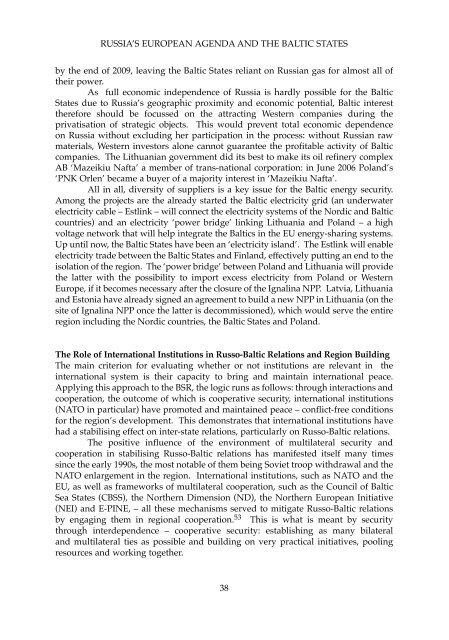Russia's European Agenda and The Baltic States - Defence ...
Russia's European Agenda and The Baltic States - Defence ...
Russia's European Agenda and The Baltic States - Defence ...
You also want an ePaper? Increase the reach of your titles
YUMPU automatically turns print PDFs into web optimized ePapers that Google loves.
RUSSIA’S EUROPEAN AGENDA AND THE BALTIC STATES<br />
by the end of 2009, leaving the <strong>Baltic</strong> <strong>States</strong> reliant on Russian gas for almost all of<br />
their power.<br />
As full economic independence of Russia is hardly possible for the <strong>Baltic</strong><br />
<strong>States</strong> due to Russia’s geographic proximity <strong>and</strong> economic potential, <strong>Baltic</strong> interest<br />
therefore should be focussed on the attracting Western companies during the<br />
privatisation of strategic objects. This would prevent total economic dependence<br />
on Russia without excluding her participation in the process: without Russian raw<br />
materials, Western investors alone cannot guarantee the profitable activity of <strong>Baltic</strong><br />
companies. <strong>The</strong> Lithuanian government did its best to make its oil refinery complex<br />
AB ‘Mazeikiu Nafta’ a member of trans-national corporation: in June 2006 Pol<strong>and</strong>’s<br />
‘PNK Orlen’ became a buyer of a majority interest in ‘Mazeikiu Nafta’.<br />
All in all, diversity of suppliers is a key issue for the <strong>Baltic</strong> energy security.<br />
Among the projects are the already started the <strong>Baltic</strong> electricity grid (an underwater<br />
electricity cable – Estlink – will connect the electricity systems of the Nordic <strong>and</strong> <strong>Baltic</strong><br />
countries) <strong>and</strong> an electricity ‘power bridge’ linking Lithuania <strong>and</strong> Pol<strong>and</strong> – a high<br />
voltage network that will help integrate the <strong>Baltic</strong>s in the EU energy-sharing systems.<br />
Up until now, the <strong>Baltic</strong> <strong>States</strong> have been an ‘electricity isl<strong>and</strong>’. <strong>The</strong> Estlink will enable<br />
electricity trade between the <strong>Baltic</strong> <strong>States</strong> <strong>and</strong> Finl<strong>and</strong>, effectively putting an end to the<br />
isolation of the region. <strong>The</strong> ‘power bridge’ between Pol<strong>and</strong> <strong>and</strong> Lithuania will provide<br />
the latter with the possibility to import excess electricity from Pol<strong>and</strong> or Western<br />
Europe, if it becomes necessary after the closure of the Ignalina NPP. Latvia, Lithuania<br />
<strong>and</strong> Estonia have already signed an agreement to build a new NPP in Lithuania (on the<br />
site of Ignalina NPP once the latter is decommissioned), which would serve the entire<br />
region including the Nordic countries, the <strong>Baltic</strong> <strong>States</strong> <strong>and</strong> Pol<strong>and</strong>.<br />
<strong>The</strong> Role of International Institutions in Russo-<strong>Baltic</strong> Relations <strong>and</strong> Region Building<br />
<strong>The</strong> main criterion for evaluating whether or not institutions are relevant in the<br />
international system is their capacity to bring <strong>and</strong> maintain international peace.<br />
Applying this approach to the BSR, the logic runs as follows: through interactions <strong>and</strong><br />
cooperation, the outcome of which is cooperative security, international institutions<br />
(NATO in particular) have promoted <strong>and</strong> maintained peace – conflict-free conditions<br />
for the region’s development. This demonstrates that international institutions have<br />
had a stabilising effect on inter-state relations, particularly on Russo-<strong>Baltic</strong> relations.<br />
<strong>The</strong> positive influence of the environment of multilateral security <strong>and</strong><br />
cooperation in stabilising Russo-<strong>Baltic</strong> relations has manifested itself many times<br />
since the early 1990s, the most notable of them being Soviet troop withdrawal <strong>and</strong> the<br />
NATO enlargement in the region. International institutions, such as NATO <strong>and</strong> the<br />
EU, as well as frameworks of multilateral cooperation, such as the Council of <strong>Baltic</strong><br />
Sea <strong>States</strong> (CBSS), the Northern Dimension (ND), the Northern <strong>European</strong> Initiative<br />
(NEI) <strong>and</strong> E-PINE, – all these mechanisms served to mitigate Russo-<strong>Baltic</strong> relations<br />
by engaging them in regional cooperation. 53 This is what is meant by security<br />
through interdependence – cooperative security: establishing as many bilateral<br />
<strong>and</strong> multilateral ties as possible <strong>and</strong> building on very practical initiatives, pooling<br />
resources <strong>and</strong> working together.<br />
38

















